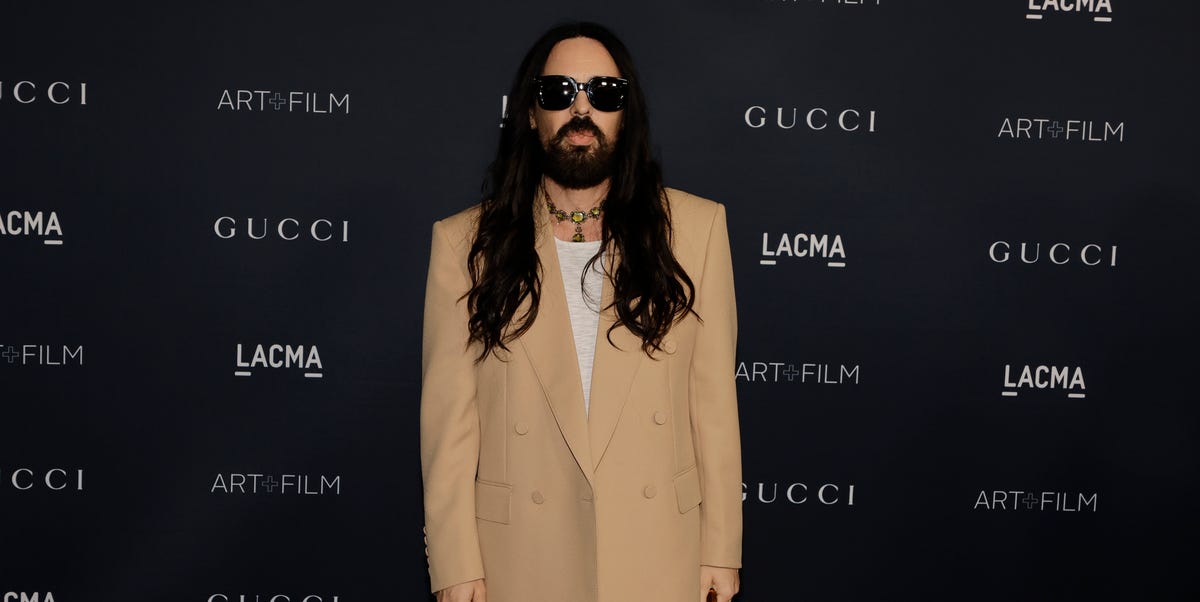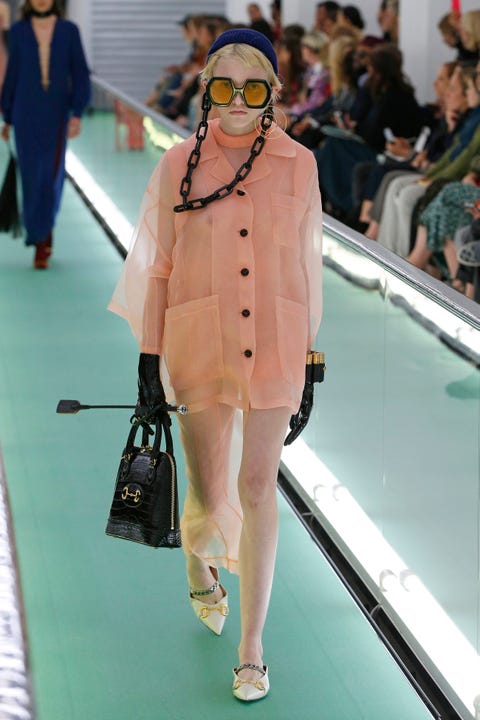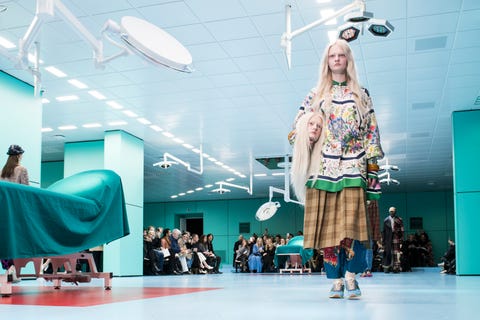Alessandro Michele, the 49-year-old who came from the anonymous caverns of the design department to revolutionize Gucci, will exit the brand, Gucci announced in a statement today.
In the press release, Marco Bizzarri, president and CEO of Gucci, thanked Michele for his dedication to the house over the past eight years, “and for his vision, devotion, and unconditional love for this unique brand.” François-Henri Pinault, chairman and CEO of Kering, which owns Gucci, stated that what Michele achieved will long be considered an important period in the history of the brand: “His passion, his imagination, his ingenuity and his culture put Gucci center stage, where its place is. I wish him a great next chapter in his creative journey.”
For his part, Michele called Gucci “my home, my adopted family,” thanking his team and all who supported Gucci his gratitude. “May you continue to nourish yourselves with poetic and inclusive imagery, remaining faithful to your values. May you always live by your passions, propelled by the wind of freedom.”
Speculation about to the announcement began on Tuesday evening, when an unidentified source told WWD that the designer’s departure was imminent. A “well-placed source” told the paper that Michele “was asked to initiate a strong design shift” at the brand by parent company Kering; Gucci had been a juggernaut for the conglomerate since Michele presented his first collection for the brand in 2015, but in 2021, industry insiders began speculating whether energy around the label had cooled. There was occasional chin-stroking over whether the magpie aesthetic Michele developed—that of a global traveling, gender fluid hipster with a taste for Hollywood and history, accessorized to the hilt—might be stagnant. A Resort show, staged at a castle in Puglia in May, was well-received for its strange sexiness, and the spring 2023 collection modeled by 68 sets of twins won praise as a feat of casting, but perhaps this was not enough.
Or perhaps Pinault simply wants the brand to head in another direction. Gucci is considered Kering’s marquee brand, generating over $6 billion in revenue in 2021, although in recent years, Balenciaga, under creative director Demna, and Saint Laurent, helmed by Anthony Vaccarello, have also been stars at the conglomerate. Bottega Veneta, too, experienced record growth under the mercurial designer Daniel Lee, who exited the brand under a flurry of controversy in November 2021 (and was recently announced as Burberry’s new creative director), and was then replaced with his second-in-command Matthieu Blazy. That reshuffling has led to a subtler, but no less extraordinary expression of cognoscenti luxury and chic, though whether Pinault has that in mind as a playbook, or sees the “New New Bottega,” as its known, as a bellwether of shifting tastes, is of course impossible to say.
From the moment Michele debuted his first collection for the house, a menswear show at January 2015’s Milan men’s fashion week, he set off ripples that shifted the entire fashion industry, both in aesthetics and business. Michele was plucked from relative obscurity, having worked at the brand since 2002 under Tom Ford, and the move practically thumbed its nose at the habit of bold-faced name designer appointments that generally drive fashion world buzz. (Ford had also driven a record turnaround at Gucci, and the two became close friends during Michele’s tenure as creative head.) That first collection, which was assembled by Michele in only five days, showed geek-chic boys in undersized sweaters and pussybow blouses, and shrunken jackets and fur-trimmed jackets that appeared pinched from granny’s dusty closet. His gender-fluid vision would reorient the very codes of “androgynous” dressing in the realms of high fashion and celebrity, encouraging all of fashion, and specifically “masculine” styles, to become more feminine.
Michele found trusted avatars for this look in stars like Jared Leto and Florence Welch, and then, as his bric-a-brac collections grew more sprawling and ambitious, he brought larger stars into the fold to help proselytize: Dakota Johnson, Rihanna, A$AP Rocky, and, most famously, Harry Styles. Perhaps no brand has worked the field of celebrity so successfully, making a daring vision so popular on such a mass scale. Within months of his arrival, his kangaroo fur-lined Gucci mules had turned legions of shoppers, from the toniest enclaves of Los Angeles to the punkest millennial sections of New York, Paris, and London, into nerdy jet-setters who seemed to make any room their first class lounge. Michele’s clothes, and the wild, maximalist styling of his collections, seemed to perfectly encapsulate the twenty-something’s view of luxury as culture—a postmodern mishmash generated by constant travel and the then- sparkling new Instagram feed spitting out a tantalizing rash of aspirational lifestyles. It was as if Michele saw the selfie as a Renaissance portrait, with all the stuff we show off symbolizing our position in the world, with brand names and hashtags as contemporary heraldry.
As Michele charged his vision forward at a nearly unstoppable pace, he proved himself adept at adjusting to the new demands of the politically-engaged, fashion-fluent millennial consumer. When he showed a jacket that eagle-eyed observers on Instagram identified as a knockoff of defunct Harlem couturier Dapper Dan’s, Michele gave Dap the funds to restart his atelier. When he was accused of cultural appropriation, he invited the then-unknown Diet Prada to attend the show and identify his references. When social media users pointed out that a Leigh Bowery-inspired turtleneck, outside of the runway context of Michele’s barrage of products, looked like blackface, he assembled a team of advisors (including several millennials) to teach Gucci employees about race and diversity.
And when the pandemic hit, Michele became especially existential. He had just staged a show in Milan that made the guts of the runway—hair, makeup, models getting dressed—into the spectacle itself, and was also frequently staging resort shows all over the world. In an Instagram post, he questioned whether the industry was demanding too many shows, creating too many shows, and producing too many ideas. Gucci, he proposed, would go seasonless, and show only when they felt like it. Eventually, though, like so many other designers, he returned to business (somewhat) as usual. In spring 2021, Michele set off a fervor for luxury brand team-ups when he upended the high-meets-low model of collaborations by working with Demna to “hack” the codes of Balenciaga, merging the visions of the two brands on the runway.
Who will replace Michele? Well, who is even up to the task? This past June, the brand split runway and merchandising efforts, with Michele overseeing the former and Maria Cristina Lomanto, previously CEO of Roger Vivier, recruited to oversee the latter. Perhaps Lomanto will take over; perhaps there is a young and eager Alessandro acolyte waiting in the wings. In the release, Gucci stated that its design studio will carry forward the vision until a new arrangement is announced.
But the end (at least for now) of Michele’s impact on fashion in his shows will create quite a gulf. Whether he will start his own label, move to another brand, or take another path completely remains to be seen. But his influence will be felt, on celebrity, gender fluid styles, and the integration of political positions with fashion, for years to come.
Rachel Tashjian is the Fashion News Director at Harper’s Bazaar, working across print and digital platforms. Previously, she was GQ’s first fashion critic, and worked as deputy editor of GARAGE and as a writer at Vanity Fair. She has written for publications including Bookforum and Artforum, and is the creator of the invitation-only newsletter Opulent Tips.


